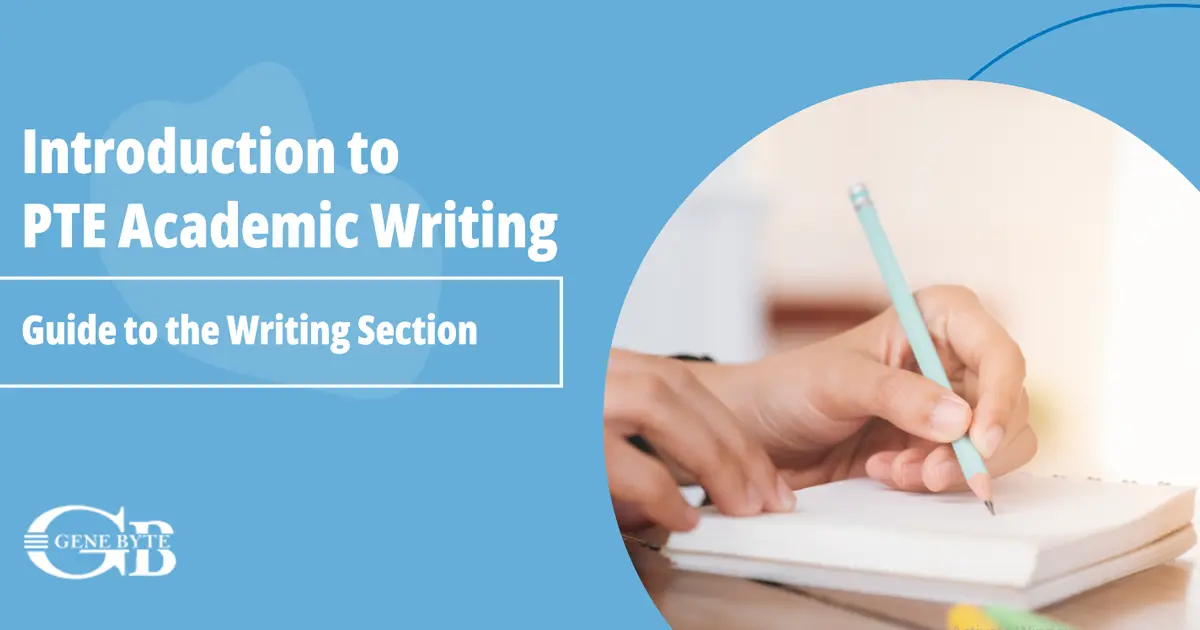Elevate Your Institute's Success with Genebyte's Tailored Teaching Tools.
Imagine a classroom where the Writing section of PTE Academic is clear, and educators have the right tools to guide students to success. With Genebyte's innovative SaaS solutions, this is possible.
Key Takeaways:
- Illuminate the Writing Section: Understand the intricacies of the PTE Academic Writing section.
- Showcase SaaS Solutions: Learn how Genebyte's solutions can transform teaching methods.
- Focus Areas: The Summarize Written Text and Write Essay tasks.
- Skill and Art: Conveying complex ideas clearly is a critical skill demanded by this section.
- Enhanced Outcomes: Use AI-driven platforms for detailed assessment and feedback, improving results for both students and institutes.
Join us in making the Writing section easier to teach and learn with Genebyte's advanced tools and insights to help coaching institutes master teaching these skills.

Introduction to PTE Academic Writing
The Importance of Writing in English Proficiency Tests
In the global arena of higher education and professional advancement, proficiency in English is a keystone of success. Among the core competencies evaluated by English proficiency tests, writing stands out as a critical skill. It is the window through which examiners view a candidate's ability to organize thoughts, articulate arguments, and harness the nuances of the language.
At Genebyte, we understand the gravity of this skill. Our SaaS solutions are meticulously designed to support coaching institutes in honing the writing acumen of their students for the PTE Academic tests. With a focus on real-world application, our technology bridges the gap between academic knowledge and practical usage.
Overview of PTE Academic Writing Section
Following the Speaking section, the Writing section of PTE Academic challenges test-takers to demonstrate their written English skills in two distinct tasks:
- Summarize Written Text: This task measures the ability to distill complex information into a succinct summary while retaining the essence of the content.
- Write Essay: Here, students must craft a coherent and persuasive essay on a given topic, showcasing their ability to reason and express ideas effectively.
PTE Academic Writing Tasks Overview
| Task | Skills Assessed | Time Allotted | Scoring Criteria |
|---|---|---|---|
| Summarize Written Text | Conciseness, Content, Grammar | 10 minutes | Partial Credit |
| Write Essay | Coherence, Structure, Argument Development | 20 minutes | Correctness |
Genebyte's platforms leverage AI to replicate the scoring algorithms of the PTE Academic, providing educators with an accurate assessment of a student's readiness. Our services allow teachers to identify areas of improvement in real-time, ensuring that every minute spent in preparation translates to better writing proficiency.

Summarize Written Text
Within the Writing section of the PTE Academic, the Summarize Written Text task is pivotal. It serves as a litmus test for a student's ability to comprehend, analyze, and succinctly encapsulate complex ideas.
Objective of the Task
The core objective here is to condense a lengthy passage into a single sentence, maintaining the original intent and key points. It's not merely about brevity but also about precision and coherence.
Strategies for Effective Summarization
At Genebyte, we empower educators with strategies that fuse linguistic skill with critical thinking. Here are some we advocate:
- Identify Key Elements: Encourage students to pinpoint main ideas and supporting details.
- Practice Paraphrasing: Teach students to rewrite concepts in their own words without altering the original meaning.
- Focus on Coherence: Guide students to connect ideas seamlessly, crafting a summary that flows logically.
Summarization Strategies Enabled by Genebyte's Platform
- Interactive exercises focusing on identifying thesis statements and topic sentences
- Real-time feedback on paraphrasing and vocabulary usage
- Coherence tracking to ensure logical flow and connectivity in summaries
Grading Criteria and Scoring
Genebyte's AI-evaluation mimics the PTE scoring algorithm, considering factors like content coverage, form, grammar, and vocabulary. This allows for an accurate representation of how students' responses would be graded in the actual exam.
Grading Criteria for Summarize Written Text
| Criterion | Description | Genebyte's AI Assessment Features |
|---|---|---|
| Content Coverage | Accuracy in reflecting the main ideas | Analysis of key points inclusion |
| Form | Adherence to the one-sentence requirement | Structure and length evaluation |
| Grammar | Correct use of language structures | Grammar checking and correction tips |
| Vocabulary | Appropriate word choice | Vocabulary richness and appropriateness |
Our platform provides educators with detailed insights into each student's performance, highlighting strengths and pinpointing areas that need improvement. This data-driven approach not only refines teaching strategies but also ensures that preparation is aligned with scoring realities.

Write Essay
The Write Essay task of the PTE Academic tests a candidate's ability to produce written language and express thoughts in an academic format. This is where teaching transcends conventional boundaries, and Genebyte's solutions come to the forefront as pivotal tools for educators.
Understanding the Essay Requirements
The essay task demands students to construct a well-organized argument on a given prompt within a limited time frame. Mastery of this task lies in understanding the prompt accurately and responding with relevance and depth.
Essay Task Requirements
- Comprehend the prompt: Identify the key question or statement.
- Structure your response: Organize thoughts into introduction, body, and conclusion.
- Develop arguments: Provide reasons and examples to support views.
Genebyte's platform enables educators to guide students through interactive modules that simulate real exam conditions, ensuring that students internalize these requirements as second nature.

Crafting a Coherent and Structured Response
A coherent essay is a symphony of ideas, each flowing seamlessly into the next. Genebyte's analytical tools assist teachers in imparting strategies for crafting structured responses:
- Outline Generation: Students learn to create outlines for their essays, a critical step facilitated by Genebyte's software.
- Logical Argumentation: Our technology helps students develop the skill of connecting ideas logically.
- Transitional Techniques: We teach the use of transitional phrases to ensure fluidity in essays.
Structuring an Essay
| Section | Purpose | Genebyte's Training Focus |
|---|---|---|
| Introduction | Present the topic and thesis | Crafting engaging openings |
| Body Paragraphs | Develop arguments and analysis | Linking ideas cohesively |
| Conclusion | Summarize and restate thesis | Effective closing techniques |
Evaluation Parameters for Essays
The PTE Academic's criteria for essay evaluation are rigorous, encompassing the content's quality, presentation, and language use. Genebyte's AI closely emulates these parameters, offering precise, actionable feedback.
Evaluation Parameters
- Content Quality: Relevance and depth of the argument.
- Linguistic Range: Use of a variety of grammatical structures and vocabulary.
- Mechanical Accuracy: Correctness of grammar, punctuation, and spelling.
Educators equipped with Genebyte's software can provide students with a detailed analysis of their practice essays, benchmarked against these criteria. This facilitates a level of preparation that is thorough, focused, and immensely effective.

Scoring Dynamics in PTE Writing
Integrated Scoring System
In PTE Academic, the Writing section is not an isolated challenge; it's integrally linked with other language skills, particularly reading. Understanding this interconnected scoring dynamic is crucial for educators to tailor their teaching strategies effectively.
How Writing Scores Contribute to Reading Skills
Writing, at its core, is an act of communication, but it also demonstrates comprehension. When students construct written responses, they are also showcasing their reading abilities. This duality is reflected in the PTE scoring system, where certain writing tasks contribute to the Reading section score.
Contribution of Writing to Reading
- Synthesis of Texts: Ability to condense and summarize texts shows reading comprehension.
- Vocabulary Usage: Appropriate word choice indicates a strong grasp of reading material.
- Logical Structure: Coherent writing mirrors the understanding of text structure.
Genebyte's SaaS solution dissects these components, offering educators detailed analytics on how each aspect of a student's writing may affect their reading scores.
The Role of Content and Form in Scoring
The PTE assesses not just what students write but how they write it. Content quality and formal accuracy are both critical.
Content and Form in PTE Writing Scoring
| Aspect | Importance | Genebyte's Evaluation Features |
|---|---|---|
| Content Quality | Must effectively address the prompt | Depth and relevance analysis |
| Formal Accuracy | Grammar, punctuation, and spelling are key | Real-time corrective feedback |
Genebyte's platform ensures that educators can provide instant, targeted feedback, focusing on both the substance and the structure of writing.
Weightage of Writing Tasks in Overall Score
With each task weighted differently, it's vital for educators to understand where to focus their teaching efforts for maximum score impact.
Prioritizing Tasks Based on Score Contribution
Educators can use Genebyte's insights to prioritize tasks that carry more weight, ensuring that students invest time where it's most likely to result in score gains.
Task Prioritization
- Essay Writing: Develop argumentative and persuasive writing for high-impact scores.
- Summary Writing: Focus on concise expression for integral reading-writing linkages.
Balancing Content and Language Proficiency
A strategic balance between teaching content generation and refining language skills is necessary for students to excel.
Balancing Teaching Focus
| Content Creation | Language Proficiency | Genebyte's Balanced Approach |
|---|---|---|
| Idea Development | Vocabulary Enhancement | Integrated content and language exercises |
| Argument Structure | Grammar and Syntax Mastery | Customizable feedback for continuous improvement |
Genebyte's SaaS platform provides the tools to strike this balance, offering a comprehensive suite of exercises and assessments that cater to both content and language proficiency.

Enhancing Writing Skills Through Technology
Genebyte's AI-driven Evaluation Portals
In the digital age, technology plays a pivotal role in education, and Genebyte is at the vanguard, revolutionizing the way writing skills are taught and assessed for PTE Academic.
The Technological Advantage in Teaching Writing
The traditional pen-and-paper approach to teaching writing is transformed by Genebyte's AI-driven portals. These platforms provide a competitive edge, allowing for an interactive, data-driven teaching methodology that adapts to each student's learning curve.
Technological Advantages
- Instant Feedback: Real-time corrections and suggestions.
- Personalized Learning: AI algorithms that adapt to individual student needs.
- Progress Tracking: Comprehensive reports on student improvement over time.
Features of the AI-based Evaluation System
Genebyte's evaluation system mimics the PTE Academic's scoring with sophisticated algorithms that assess writing quality on multiple dimensions.
AI Evaluation System Features
| Feature | Description | Benefit to Educators |
|---|---|---|
| Automated Scoring | Accurate, instant scoring of writing tasks | Reduces grading time, increases teaching efficiency |
| Detailed Analytics | In-depth analysis of student performance | Enables focused instruction strategies |
| Adaptive Learning Pathways | Customized exercises based on student performance | Promotes targeted skill development |
Benefits for Educators and Institutes
Genebyte's technology not only enhances the learning experience for students but also offers substantial benefits for educators and institutes.
Streamlining the Assessment Process
By automating the assessment process, Genebyte's portals free up valuable time for educators, allowing them to dedicate more resources to active teaching rather than grading. It has the following benefits:
- Efficiency: Automated grading for quicker turnaround.
- Accuracy: Consistent and unbiased evaluations.
- Scalability: Ability to handle large volumes of student work effortlessly.
Providing Actionable Insights for Instruction
The wealth of data generated by Genebyte's portals equips educators with actionable insights, enabling them to fine-tune their teaching strategies for maximum effectiveness.
Insights for Instruction
| Data Point | Insight Provided | Instructional Benefit |
|---|---|---|
| Error Patterns | Common student mistakes | Targeted grammar and style lessons |
| Performance Trends | Improvement trajectories and plateaus | Customized pacing and focus areas |
| Comparative Analysis | Student performance versus cohort benchmarks | Peer learning and motivation tactics |
Genebyte's platforms not only streamline the assessment process but also enhance the quality of instruction, leading to better learning outcomes and ultimately, higher PTE Academic scores. This technology-enabled approach propels institutes to the forefront of PTE preparation, ensuring they remain competitive in an ever-evolving educational landscape.

Implementing Genebyte Solutions in Curriculum Design
At Genebyte, we understand that incorporating new technology into established educational frameworks can be daunting. Our goal is to make this integration seamless, aligning with existing teaching plans, and enhancing the overall learning experience with minimal disruption.
Integration with Existing Teaching Plans
Our SaaS solutions are designed to complement, not overhaul, the hard work that educators have already put into their curriculum design.
Steps for Integration
- Assessment of Current Curriculum: Review and identify areas for enhancement.
- Phased Implementation: Gradual introduction of Genebyte tools into the teaching plan.
- Compatibility Checks: Ensuring Genebyte's platforms work in tandem with existing resources.
Genebyte's software dovetails with the PTE Academic Writing section's requirements, providing a smooth transition that respects and builds upon the educator's existing structure.
Customization for Targeted Learning Outcomes
Every institute has its unique set of goals and student needs. Our solutions are not one-size-fits-all; they are adaptable to target specific learning outcomes.
Customization for Learning Outcomes
| Learning Outcome | Genebyte Customization |
|---|---|
| Enhanced Essay Writing Skills | Advanced essay feedback tools |
| Improved Summarization Abilities | Summarization exercises with instant analysis |
| Holistic Language Development | Integrated tasks that blend writing with other language skills |
Educators can select which features of our platform to employ, crafting an educational experience that aligns with their specific pedagogical goals.
Continuous Support and Training for Educators
We believe in not just providing tools but also ensuring that educators are well-equipped to use them to their fullest potential.
Support and Training Components
- Initial Setup Assistance: Guiding educators through the implementation process.
- Ongoing Training Sessions: Regular workshops to keep teaching staff up-to-date.
- Responsive Help Desk: Real-time support for any challenges encountered.
Real-Life Example:
Consider the success story of the English Learning Hub, a mid-sized coaching institute that integrated Genebyte's AI-evaluation portal.
- Within six months, they reported a 25% increase in their students' average writing scores, attributing this success to the personalized feedback and the ability to track progress over time, which were instrumental in identifying and addressing learning gaps.
- The continuity of support from Genebyte was a crucial factor in this improvement, demonstrating the long-term benefits of partnering with a technology provider that understands educational needs.

The Future of PTE Writing Prep
As the academic landscape evolves, embracing technology is not just an option; it's imperative for educational excellence. Genebyte stands at the forefront of this evolution, offering a B2B SaaS solution that promises a new horizon for PTE writing preparation.
Embracing Technology for Educational Excellence
Genebyte's technology offers a glimpse into the future of language proficiency testing and preparation. By leveraging our AI-driven evaluation portals, coaching institutes can ensure that their students are not just prepared for the PTE Academic Writing section, but are ahead of the curve.
Advantages of Technology in Education
- Adaptability to Changing Test Formats: AI systems are quick to adjust to changes in test patterns.
- Data-Driven Insights: Making informed decisions to help students strengthen their writing skills.
- Global Benchmarking: Providing students with a sense of where they stand on a global scale.
Our commitment to educational excellence is reflected in the continuous updates and enhancements to our platform, ensuring that our partner institutes always have the most cutting-edge tools at their disposal.
Genebyte's platform is more than just software; it's a partnership that grows with you. We invite you to join us in shaping the future of PTE Writing prep.
Genebyte's Commitment
| Action Point | Our Commitment |
|---|---|
| Adopt our AI evaluation tools | We provide a comprehensive onboarding process to integrate our tools seamlessly into your curriculum. |
| Customize your teaching strategies | Our platform is adaptable, with features that can be tailored to your institute's unique goals. |
| Invest in ongoing success | We offer ongoing support and training, ensuring that your educators are always at the forefront of educational technology.skills |
We urge progressive coaching institutes to take this step towards modernizing their curriculum with Genebyte. By doing so, you're not just preparing students for a test; you're equipping them with skills that transcend the classroom and are invaluable in real-world communication.

Actionable Tips for PTE Academic Writing Excellence
In the quest for PTE Academic success, the Writing section demands nuanced preparation and a deep understanding of linguistic nuances. Here are actionable tips to elevate the teaching methodologies at your coaching institute:
- Leverage AI-driven Tools: Implement Genebyte's AI evaluation to provide instant, accurate feedback, simulating real PTE scoring.
- Focus on Structure and Content: Emphasize well-structured responses aligned with PTE guidelines using Genebyte's templates.
- Conduct Regular Mock Tests: Simulate the PTE environment to help students adapt to exam pace and pressure.
- Invest in Teacher Training: Keep educators updated with the latest PTE standards through Genebyte's professional development sessions.
The PTE Writing section tests clarity and precision in the exam, and Genebyte's B2B SaaS solutions provide the edge needed to excel. Our AI-driven platforms enhance teaching methods and boost student performance.
The Genebyte Advantage
Partner with Genebyte to unlock your students' potential and redefine success in PTE Academic Writing preparation. Visit our website, schedule a demo, or contact us to learn more.
Frequently Asked Questions
PTE Academic Writing consists of two primary tasks: Summarize Written Text and 'Write Essay.' In the first task, students must condense a passage into one sentence. In the essay task, they must write a 200-300 word argumentative essay on a provided topic.
- Summarize Written Text: One sentence only, between 5 and 75 words.
- Write Essay: Respond to the prompt with 200-300 words within the given time limit.
- Adhere to formal academic writing style.
- Use correct grammar, punctuation, and spelling.
PTE Writing is scored based on various factors such as grammar, vocabulary, spelling, written discourse, and essay development. The Summarize Written Text task also contributes to the reading score, reflecting comprehension skills.
While specific examples cannot be provided here, Genebyte's platforms offer a plethora of practice prompts and real-time feedback for both Summarize Written Text and Write Essay tasks, reflecting real exam conditions.
PTE Writing is a section of the PTE Academic exam that evaluates a test-taker's ability to produce written English in an academic context. It involves summarizing written text and composing essays.
Effective PTE Writing techniques include:
- Understanding the main ideas and themes.
- Practicing paraphrasing skills.
- Organizing essays with clear structure.
- Using a variety of sentence structures and vocabulary.
- Proofreading to correct errors.
Certainly! Here are some top tips:
- Plan your essay before writing.
- Focus on clear and concise summaries.
- Use transitional phrases for coherence.
- Enhance vocabulary for variety and precision.
- Utilize Genebyte's AI feedback for improvement.
PTE Writing is algorithmically scored on content, form, grammar, vocabulary, and spelling. The scoring also considers the quality of the written discourse, including the development, structure, and coherence of the writing.
The PTE Writing section typically includes 1-2 Summarize Written Text questions and 1-2 Write Essay prompts.
The PTE Writing syllabus encompasses the skills of summarizing written texts and essay writing, requiring mastery of language and structure to convey ideas effectively within an academic context.
